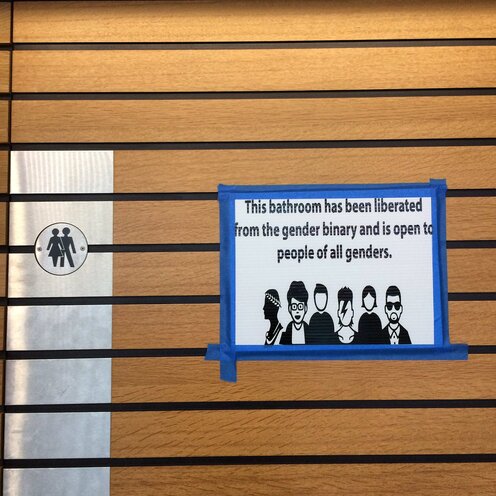Ideas for inclusive conferences and events
Update, 5 February 2019: Thank you to everyone who’s read, shared, or given feedback on this post. I’ve been thrilled by the number of people who’ve said they found it useful. I got a lot of suggestions for new ideas to add to the list, and I had some thoughts on how to make it more readable. So if you’re interested, there’s a new version at https://alexwlchan.net/ideas-for-inclusive-events/, and I’ll be trying to keep that updated more frequently. Enjoy!
I semi-regularly do a braindump of my ideas for running inclusive conferences, and I realised it would be useful to have it all written up in one place. Last week, I had a meeting with Lauren Couch, the head of Diversity and Inclusion at Wellcome, and she was kind enough to lend me the notes she wrote – this is the tidied-up version.
For better or for worse, conferences can be really important for career development. Sharing ideas, having conversations, meeting new people – if you can’t attend conferences, you miss out on a lot of these ooportunities. It’s important to open these events to as wide a range of people as possible, and make them feel welcome when they attend. It addresses a serious unfairness, and everyone benefits from having a wider diversity of people and ideas.
This is mostly based on my experience with small, community conferences in the European tech industry. Underrepresented groups in tech include women, people with disabilities, people on low income, people who don’t have European or US citizenship – and the suggestions reflect that. It definitely isn’t a complete list.
If you’re an event organiser, you can take these ideas to make your events more inclusive and accessible.
If you attend, speak at, or sponsor an event, you have power – you can ask for these accommodations where they don’t already exist. Be picky about where you choose to participate, and walk away from events that don’t meet your standards.
A few disclaimers
None of these are original ideas – this is a collection of other people’s ideas I’ve seen at conferences I’ve attended or followed online.
This post is just an outline, not a detailed implementation guide. Every item on this list could be an entire post on its own – and if somebody else has already written that, I’ve tried to link to it. There’s also a list of further reading links at the end.
I’ve helped organise PyCon UK for the last two years, and there’s heavy reference to it below – but most of these ideas predate my involvement.
Finally, don’t feel bad if you can’t do many of the suggestions on this list. I don’t know of a single conference that does everything here – even the ones I organise. This is aspirational, not a checklist. If you implement even one, that’s an improvement.
Contents
- Have a code of conduct
- Pricing and financial assistance
- Inside the venue
- Look after your speakers
- Food and drink
- Parents/guardians with young children
- Support for disabilities
- Live captioning in talks
- Sign language interpreters
- Use microphones and hearing loops
- Look after service animals in your venue
- Preferred seating for people with vision/mobility issues
- Provide detail about “wheelchair accessibility”
- Encourage speakers to think about accessibility in their slides
- Remind able-bodied attendees not to interfere
- Have sufficient breaks between sessions
- Getting to the venue
- Badges, lanyards and photography
- Newcomers
- Putting it into practice
- Further reading
Have a code of conduct
A code of conduct sets the expectation and rules for your event. It tells people what sort of behaviour is acceptable, and how violations will be dealt with. This shows potential attendees that they should feel safe at your event, and if harassment or bullying does occur, it gives them a recourse.
Advertise it prominently – on your website, when buying tickets, in your introductory remarks. Make sure people know about it.
A code of conduct is only as good as its enforcement – so you have to follow through with it. Have a documented procedure for dealing with harassment, and stick to it.
Don’t be shy about calling out problems if they occur. At PyCon UK in 2016, if a CoC violation occurred, three things would happen:
- Somebody would tweet about it from the conference Twitter account
- The problem was mentioned in the opening remarks the following day, with an explanation of what happened and how it was resolved
- After the conference, there was a code of conduct report that summarised the two issues
This helps people see that you’re enforcing the CoC (and hopefully makes them feel more comfortable making a report, if they need to). It also serves as a counterpoint to people who say “this sort of behaviour doesn’t happen in our community” – unfortunately, it almost certainly does.
Ashe Dryden has written a very thorough Codes of Conduct 101 and FAQ, which I recommend reading. It has lots of detail about what makes a good CoC, and answers common questions and objections.
Pricing and financial assistance
Conferences tickets can be expensive, and that’s before you factor in travel or accommodation costs. You can do things to make your conference more affordable to attend.
Tiered ticket rates
Lots of conferences have attendees who are being sent by an employer, and companies tend to have deeper pockets – so you can charge higher prices for them.
At the other end, you’ll have people who are just starting in the industry, and don’t have corporate backing – or maybe even a salary.
I like PyCon UK’s ticket tiers this year:
If your tickets are being paid for by your employer, please select the Corporate rate.
If you are paying for your ticket out of your own pocket, please select the Individual rate.
If you are unwaged (for example in full-time education), please select the Unwaged rate.
I prefer these tiers to “early bird rates” because somebody can get the affordable prices at any time. Early bird tickets disproportionately help people who already know about the conference, and know when tickets go on sale – which is likely to be people who are repeat attendees.
Offer financial assistance and free tickets
Tickets aren’t the only cost of a conference – you also need to pay for travel, accommodation, food, and time away from work/home. Have a budget for financial assistance grants, so you can give people money towards those costs. This expands the pool of potential attendees. Include discounted or free tickets.
Allocating those funds can be a tricky question. Personally I’d prioritise contributors (speakers and volunteers), then first-time attendees, and I’d want it to help as many people as possible – but different events will have their own priorities.
Give people a way to contribute to free tickets
Financial assistance usually comes from sponsorship, but don’t discount the generosity of your other attendees.
Here’s a screenshot from the AlterConf London ticketing page:
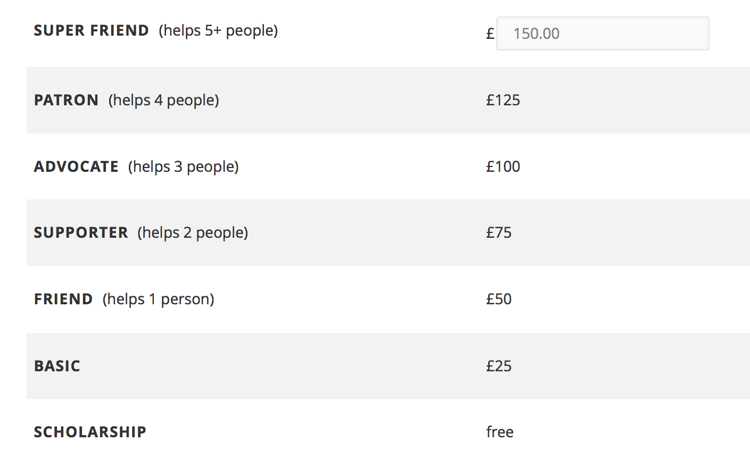
You could buy a single ticket (or claim one of the free tickets), or if you were feeling generous, you could buy extra tickets, which went into the free ticket pool.
Similarly, at PyCon UK, we sell conference swag (t-shirts, hoodies, etc) through an online shop, the proceeds of which go directly to the financial assistance budget.
Inside the venue
Offer gender-neutral bathrooms
At tech conferences I’ve been to, there are lots of trans and non-binary people, who are often excluded or marginalised by gendered toilets. Modifying your venue to have some gender-neutral bathrooms is a nice way to make them feel included.
When AlterConf was still running, it was a staple of the conference tweets to see somebody take a photo of the gender-neutral bathroom signs (this is in Berlin):
One of the many signs of a great conference. #inclusivity#alterconfpic.twitter.com/cF7XPImBPg
If it’s not possible (for example, you’re sharing your conference space), remind your attendees not to challenge somebody else’s choice of bathroom. For example, here’s a sign from one of the Write The Docs conferences:
If you’re using this toilet and you think a person’s gender doesn’t match the sign on the door, follow these steps:
Don’t worry about it, they know better than you.
If your venue is large enough, the ideal is a mixture of gender-neutral and gendered bathrooms.
(I’ve done a bunch of thinking around gender-neutral and accessible bathrooms for a work project recently; I may write another post about it later.)
Provide baskets of free toiletries
Finding basic toiletries in a strange city or country can be difficult. Providing them directly in your bathrooms relieves a bit of that stress.
I first heard of this idea from Write The Docs, who were inspired by DjangoCon Europe. Here’s an excerpt from DjangoCon’s sponsor brochure:
Bathroom basket sponsor
We’ll provide baskets with basic medical, sanitary and similar supplies for free at the conference bathrooms.
This ensures that if somebody is caught out in the middle of the day, they don’t need to go far for help – or miss much of the conference.
Examples of what you might include: sanitary products, spray-on deodorant, sunscreen, toothbrushes.
Put the same products in all your bathrooms, including sanitary products – although the majority of people who get periods will probably use the women’s bathrooms, there may be people who get periods using the men’s and accessible bathrooms as well.
You probably can’t leave painkillers and medication in the bathrooms (where children can get them). Keep some on the registration desk, and people can ask for them if they need them.
Have a quiet room
Give people a space to take a break away from the bustle of the conference.
Networking and socialising is an important part of conferences, but it tires a lot of people out. Have a clearly-marked, designated space where people can sit quietly, not talk to anybody, and recover some of their energy. I wrote about the quiet room at PyCon UK in 2016, and sitting in the quiet room is how I’ve got through a number of other conferences.
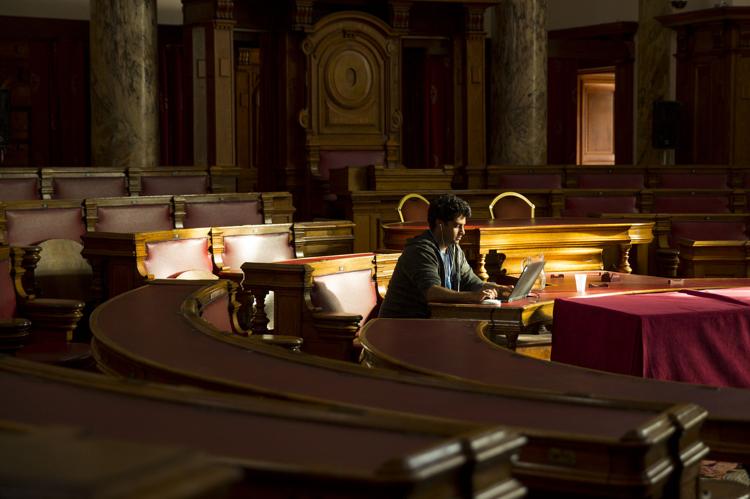
Offer a prayer room
Most events in the tech industry are secular, but that doesn’t mean they shouldn’t welcome delegates from different faith backgrounds.
If you have the space, a room dedicated for prayer would be a nice accommodation. Specify what equipment you provide, if any. (I’m sure I knew a conference offering this, but I can’t find a reference now.) If you don’t have enough rooms, pointers to local places of worship would also be useful.
Clear internal signage
Have dedicated, branded signage, with large and clear text. Help your attendees find their way around unfamiliar venues.
The branding makes it clear that the signs are for your event, and not the standard venue signage, or part of another event.
Good signage will save your volunteers from answering the same question repeatedly, and helps attendees who can’t find a volunteer, or who might feel awkward asking.
Make it easy to spot your volunteers
If somebody has a question, a concern, or a code of conduct violation to report, they need to find a volunteer, so make the volunteers easy to spot. Possible approaches include brightly coloured, branded t-shirts, or different lanyards from everyone else.
If you have places that are continuously staffed during conference hours (for example, the registration desk), make sure you tell people. It may not always be the most convenient, but it’s good to know that fallback exists.
Look after your speakers
Compensate and pay expenses for your speakers
Preparing a conference talk is a lot of work. If you don’t pay your speakers, you’re restricting yourself to people who can afford to do that preparation without being paid. That excludes a lot of potential speakers.
Ideally, you should be compensating speakers for their preparation time, travel, accommodation, and time away from home. You probably want to throw in a free ticket as well, so they can hang around after their session is over.
Whatever your speaker package is (even if you can’t pay anything), be upfront about it in your call for proposals. If somebody can’t or won’t speak at your conference without compensation, it’s better to know that before they submit. Don’t waste time getting proposals that have to be withdrawn later.
(Python conferences are especially bad at this, and it’s something I feel acutely guilty about.)
Offer a mentoring programme
Speaking at a conference can be really intimidating, especially if you’re not used to public speaking. You might be nervous, or uncertain, or even attending a conference that isn’t held in your first language!
Offering a speaker mentoring programme can give those people a confidence boost. If somebody is new or nervous, pair them with an experienced speaker who can help them practice and prepare. It’s a great way to get more speakers from different backgrounds, and ensure you have speakers for many years to come!
I like the page on speaker mentoring for PyCon UK 2016. I particularly like that it’s not just practice, but you’re encouraged to ask for other types of help as well:
It could be any kind of help, for any kind of reason: anything from someone who can advise on whether your idea for a talk is a good one to someone who’ll be happy to hear you practise it; even someone who’ll agree to be the session chair for your talk at the event. You tell us what kind of help you’d like.
Run lightning talks/open mic sessions
Not everyone can or wants to prepare a full session – but that doesn’t mean they can’t have a chance to speak.
Lightning talks are short, quickfire talks – typically five minutes or less. Ususally you run a series of them back-to-back. They’re fun to watch because you get a variety of topics in a short space of time, and five minutes is long enough to say something interesting, without needing lots of preparation. And at least at conferences I’ve been to, the audience is very supportive and friendly. It’s a great venue for somebody to try speaking for the first time.
It’s important to make these talks a dedicated part of the schedule – for example, at PyCon US, there was a slot for lightning talks at the beginning and end of the day. I’ve seen a few events run them in the lunch break, when most people would rather have food and talk to people. Making it a timetabled event gets better attendance.
Last year, at PyCon UK, we experimented with the signup process. We had a lottery system with dedicated slots for new speakers. I expect we’ll run the same process this year.
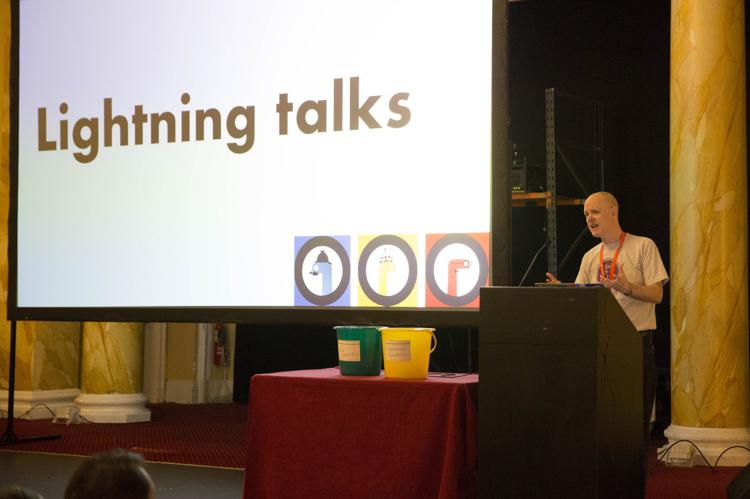
Be thoughtful with your speaker gifts
Buying gifts for your speakers is a nice gesture, and well-intentioned. Avoid common gifts that can be inadvertently insensitive:
- A bottle of wine? Not everybody drinks alcohol.
- Chocolates? Make sure you’ve checked for dairy and nut allergies, and your speaker doesn’t have an eating disorder.
- Neckties? Yes, this actually happens.
Two possible alternatives:
Socks. We had Python-coloured socks for PyCon UK 2017, because socks are an item of clothing that most people are likely to wear.
Water bottles. I think this was another PyCon, but I’m not sure. It’s another accessory that most people use, and may be grateful of before going on stage!
I’m sure you can think of other ideas that have universal appeal. And whenever a conference does this, I see a flurry of goodwill and nice tweets about it.
Ask somebody's name and pronouns before introducing them
If you’re chairing a session and need to introduce somebody, ask them:
- What they prefer to be called
- How to pronounce it (even if it seems obvious)
- What pronouns they’d like you to use
Don’t try to guess and misgender somebody, or mangle their name. It’s rude, and jarring for the speaker as they’re about to go on stage.
Double demerit if your first language is English and you make a joke about the unpronouncability of a name.
Questions, not comments
The Q&A session can be a stressful part of any talk.
Make sure you have a chair on hand to ensure things go smoothly. If somebody starts “This isn’t a question, but a comment”, cut them off. Move straight on to the next question.
People have mixed feelings about the Q&A. Some speakers find them very helpful; others prefer to answer questions in the hallway after the session. I’ve started to see CfPs that let speakers choose if they want a Q&A, and I think that’s a good compromise.
Food and drink
Be explicit about dietary requirements
You should aim to accommodate all dietary requirements.
You can anticipate some common dietary requirements in advance. Here’s a set that probably covers 90%+ of attendees:
If you know you’ll be providing food for these requirements, say so upfront. Ask for dietary requirements when people buy their ticket, so you you can make the right amount, or know if you’ve forgotten something.
Make sure food is clearly labelled, both by category and ingredients.
For allergies like nut- and gluten-free, it’s helpful to have details about the kitchen, if possible. For example, “This was prepared in a nut-free kitchen” vs “This wasn’t prepared in a nut-free kitchen, but separate utensils and surfaces were used”. For some people, that difference matters.
You may need to remind non-vegetarians not to eat all the vegetarian food, so the vegetarians don’t go hungry! Separate queues for different types of food, or taking people’s food orders in advance, can both help with this.
Provide non-alcoholic, low-caffeine and low-sugar drinks
The tech industry has a problem with alcohol. There’s a bit fo a drinking culture. Lots of events assume that everybody attending drinks alcohol, and will be comfortable drinking alcohol at the event. That excludes people (like me!) who don’t want to drink.
Similarly, not everybody wants to drink caffeinated or sugary drinks, so you should find alternatives for them as well.
You should have an equal number of alternatives, and make them equally visible. If you have a wide variety of alcohol drinks, and a token fruit juice, there’s scope for improvement.
Ernest W. Durbin III did a Twitter survey about drinks at conferences, and their article includes suggestions for good alternatives. They’ve also got links to other articles with more discussion of food and drink at conferences.
Parents/guardians with young children
Having young children can make conferences very difficult – they require full-time care, which means you’re either taking them around the conference (so you may have to leave talks or conversations in a hurry), or you need somebody else to provide childcare. Neither are easy or convenient.

Run a free crèche
I’ve seen conferences (AlterConf, XOXO, PyCon UK) that run a free crèche for attendees. You sign up in advance of the event, and then the conference hires registered and qualified childminders to look after children during conference hours. Parents have time to focus on the conference, and they know their kids are being looked after safely.
Be clear about which parts of the conference you can bring kids to (talks, dinner, after-party, etc.).
Nursing/baby care room
Breastfeeding should be destigmatised, and acceptable in all conference spaces – including in talks and at mealtimes.
Some people will prefer to breastfeed in private, so you should have a clean, quiet, private room for them. The room needs a table and a chair, and electricity and a fridge are nice to have as well. (This should be different to the quiet room mentioned above.)
Support for disabilities
Live captioning in talks
Hire a stenographer to provide real-time captioning on talks, which can be displayed on screens alongside the speaker. It helps people who are hard-of-hearing or non-native speakers, and it’s a useful tool for your other attendees too – if their focus drifts, it’s a way to catch up.
To support the captioners, ask speakers for specialist/technical terms in advance. They can be programmed into the stenographer’s keyboards, so you get more accurate transcriptions.
I first saw this at PyCon UK 2016, but I’ve also seen it at AlterConf and Coed:Ethics, and heard of it at other conferences.
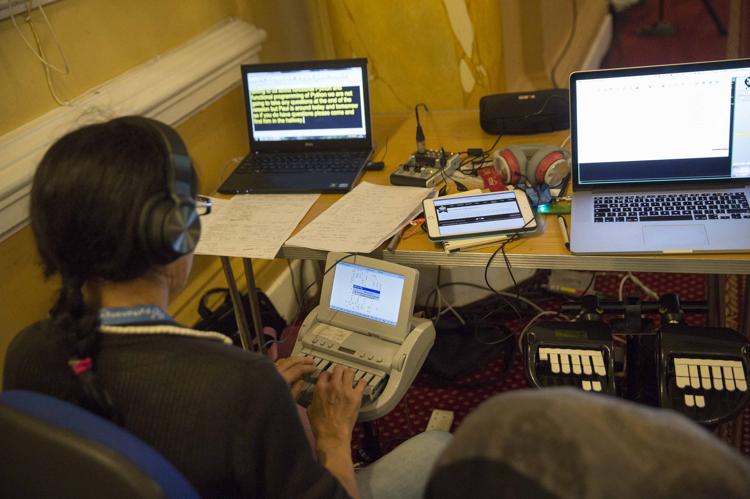
Sign language interpreters
Similar to closed captioning – sign language interpreters can help attendees who are hard-of-hearing.
This is less useful to a general audience, as most people aren’t fluent in sign language. At PyCon UK, we only provide BSL interpreters upon request (for free), whereas we always provide live captioning.
Use microphones and hearing loops
A lot of venues will have audio induction loops (it’s required by law in the UK) – provide microphones for anybody speaking, and connect them to the hearing loop.
Remind your speakers to use the microphone, even if they can project their voice – it makes it much easier for people using the hearing loop. If you have a Q&A, use a roving microphone or repeat questions into the microphone as well.
Don’t tap or blow into the microphone – the sudden noise can be painful to anybody using a hearing aid, as the sound goes straight to their ears.
Look after service animals in your venue
Allow service animals throughout your venues. And here’s a new idea to me, from this year’s GitHub Universe:
Fresh water, treats, and an onsite relief area for service or therapy dogs
Preferred seating for people with vision/mobility issues
Have reserved seating near the front of the audience for people who have vision problems, so they’ll have a clear view of the screen. (I think I saw these at AlterConf, but I can’t find a reference.)
Have reserved areas for people with wheelchairs. At AlterConf, there were aisle spaces marked out in blue tape for wheelchair users, so they could sit in the audience with their friends. Often wheelchair spaces are near the back, away from everybody else – having them inline is better.
Provide detail about "wheelchair accessibility"
It’s not enough to say a venue is “wheelchair accessible”, because wheelchairs come in different shapes and sizes. Provide detail such as:
Is there step-free access within the venue? Is it ramps or lifts? How big are the lifts?
How wide are the doorways? If the main venue is some way inside a building, what’s the narrowest doorway you need to get to the main conference area?
Are there wheelchair spaces inside the auditorium? How wide are the aisles between the seats?
Encourage speakers to think about accessibility in their slides
Some simple rules can make slides much easier for everyone to read:
- Large text
- High-contrast colours
- No animated GIFs on an infinite loop (which are distracting)
- Nothing bright and flashing (an epilepsy risk)
Posting slides online, or having printed copies, can also be useful for people who struggle to read from a projector.
Remind able-bodied attendees not to interfere
Basic etiquette includes:
- Don’t touch somebody’s mobility or assistive devices
- Don’t push somebody’s wheelchair without explicit consent
- Don’t pet service animals
- If somebody is using an interpreter, talk to the person, not their interpreter
If your attendees aren’t familiar with these rules, a reminder might be helpful.
Have sufficient breaks between sessions
Particularly in a large venue, it can be difficult for people to get around quickly. Maybe you have a wheelchair, or a child, or a foot injury, or you’re just talking to somebody about the session that just finished.
Make sure you plan sufficient breaks between session. People won’t be rushing around the building to get to talks, and your speakers will be less distracted by late arrivals.
Getting to the venue
Travel instructions
For anything but the smallest events, you’ll have attendees who aren’t local.
Provide instructions about how to get to the venue, especially if it’s non-obvious (for example, does Google Maps take you to the wrong street?). Where are the nearest public transport links?
Bonus points if you provide information about wheelchair friendly routes to the venue – your attendees don’t magically appear at your front door.
Advice on good accommodation
If you run a conference in the same place for several years, you’ll get an idea of where the good accommodation is – which hostels are friendly, which hotel is above a noisy bar, and so on. Tell people in advance – they’ll have a better night’s sleep, and enjoy your conference more! You may also be able to negotiate preferential rates for your attendees.
Last year at PyCon UK, we had a block booking at a local hostel (Mrs. Potts). Lots of people had a good stay there, we were able to solve several sudden accommodation snafus with minimal stress, and we’re recommending it to our attendees again this year.
Local information: shops, restaurants, pharmacies
There’s a good chance at least one of your organisers knows the local area, and your attendees don’t. So tell them what’s available – what’s good near the venue?
This could be shops, places to eat, local attractions, where to get emergency medication, that sort of thing. Help them not be stranded in a strange city when the conference finishes for the day.
Offer visa invitation letters for people coming from overseas
If you have international attendees, you may have somebody who needs a visa to come to the conference.
Writing a letter to say somebody is attending or speaking at your conference is a useful service, and may help their visa application. (Sadly, it’s not guaranteed.) Be upfront that this is something you can offer, and tell people how to ask for an invitation letter.
Respond to requests promptly – bureaucracy and visa applications move slowly.
I’ve been doing the visa invitation letters for PyCon UK – email me if you’d like our letter template.
Badges, lanyards and photography
Be clear about how names are used
Names are complicated, and you can’t be sure what name somebody wants to put on their badge – so ask!
The name field should be a single, free text field – no “first name, last name”, or other assumptions about the structure of names.
I’ve seen people put all sorts of names on their badges – nicknames, wallet names, maiden names, or even the online handle – whatever will help people recognise them. When you ask for the name, be very clear about how you’ll use it: “This is the name that will appear on your conference badge”.
You may need wallet names for other purposes – for example, at AlterConf Berlin, you needed legal ID to get through reception. I don’t have the exact wording, but I saw tweets from people: the signup was very explicit that this name was only used for checking ID, and wouldn’t appear on badges.
Don't put people's details in an attendee list without permission
I went to an academic conference last year, and was surprised when my welcome pack included a list of attendees – names, email addresses, and affiliated institutions.
I don’t mind giving out my email address, but I was never asked about it. Other people are less comfortable handing out details, so this list should really be opt in. Ask people if they want to be on the attendee list; don’t assume. (Or even better, don’t have one at all!)
Use coloured lanyards to let people opt out of photographs
Not everybody likes having their photograph taken, and you should make it easy for people to opt out.
Approaches like “talk to an organiser” or “put a sticker on your badge” don’t really work – they scale badly, and if you take a picture of a crowd, it’s hard to see if anybody has the badge sticker.
I’ve seen conferences that use coloured lanyards to show whether you want to appear in photographs. A couple of policies I like:
If you would rather not be in people’s photographs, please pick up a yellow lanyard when you register.
The default lanyards were blue.
White lanyard: Please do not take any photos of this person.
Black lanyard: Photos are okay. Please ask before publishing individual photos.
A red lanyard designates strictly no photos or video, a yellow lanyard designates that photos and video are allowed with explicit consent, and a blue lanyard designates that photos and video are allowed without permission.
The key is having a bright colour that means “no photos please”. It stands out in a crowd, and makes it clear if you’ve accidentally snapped somebody who ddin’t want their picture taken.
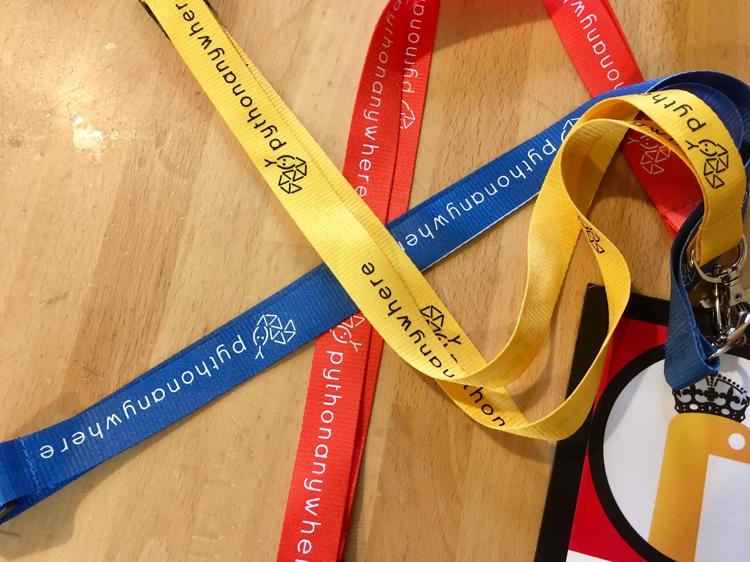
Allow people to put pronouns on their badges
I know people who like to write pronouns on their badges, to avoid being misgendered. (This is mostly, but not exclusively, trans and non-binary friends, whose appearance doesn’t match common expectations for their gender.)
You can do this in a number of ways:
- Coloured sharpies on the registration desk
- Pronoun stickers
- Offer to print it on the badge (I saw this at an AVEN conference in July, and we’re doing it for PyCon UK 2018 as well)
You shouldn’t force people to write pronouns on their badges (that has different problems) – but give them the option if they want to.
Colour communication badges
This is a way for somebody to show how comfortable they are socialising. Not everybody enjoys talking to strangers, and this gives them a way to opt out without feeling awkward.
Here’s an implementation of the system at AlterConf Berlin:
Each attendee receives three cards included with their name badge and holder. […] The colored cards can be slipped behind the name badge in the holder so they’re visible to other attendees.
A green card with a triangle means that the wearer wants people to come up and talk to them. Yellow, with a circle, means they want only people they know to approach them, and red, with a square, means that they want to be left alone. In each case, the person wearing the badge may still approach people they want to talk to, but if someone is wearing a yellow or red badge, they generally want to keep being approached to a minimum.
Note the use of shapes, so this works for colourblind attendees as well.
The system was developed by the Autistic Self Advocacy Network. I haven’t seen it at many conferences yet, but I think it’s a nice idea.
Newcomers
One of the great parts of regular conferences is having a chance to see people you don’t see anywhere else – for example, I have friends I only see when I’m at PyCon UK. But there’s a risk a conference can get a clique-y feel – everybody who’s been before knows each other, and you feel left out if you’re new and don’t know anybody. If you want your conference to grow, it’s important to make newcomers feel as welcome as the old timers.
Run specific sessions for first timers
For several years, Write The Docs conferences have run a “Welcome Wagon” – there’s a dedicated session for meeting other first-time attendees, tours of the venue, and a bunch of information about how the conference works. The Welcome Wagon for this year’s Prague conference has lots of advice and suggestions about how to get the most from the conference.
Although a lot of that page is Prague or Write The Docs-specific, the questions apply to any conference – you could write answers for your event.
Publish a glossary of terms
If they run for a long time, conferences develop fun traditions and in-jokes. That’s okay, but consider publishing a glossary of these terms, so somebody who’s new doesn’t feel confused or left out (here’s an example from DjangoCon Europe 2016).
If you're a regular attendee, meet new people
If you’re the person who’s attends the same conference regularly, take some time to break out of your bubble and meet newcomers. Here are two approaches I like:
Ned Batchelder, PyCon 2018:
if this is your Nth PyCon, then you have to meet N new people every day. My strategy was at breakfast and lunch, when wandering around looking for a table to sit at, choose one with no one I know, and with people that don’t look like me.
Eric Holscher: The Pac-Man rule:
When standing as a group of people, always leave room for 1 person to join your group.
At PyCon UK last year, there was a #social channel in the conference Slack. If a group of people were going out for the evening, and had room for a few more, they’d post it in this channel – and people would take up that invitation.
Putting it into practice
I hope these ideas are useful, and you can use them to make your events more inclusive.
As I said at the start – don’t feel bad if there are suggestions here that you can’t do. I’ve never seen a conference that implements all of these, or even most of them. Some of this is expensive (either in time or money), and you can’t do it all. Consider it a list of suggestions, not absolute requirements.
Just do your best – some improvements are better than no improvements. Anything you can do to make your event more inclusive is a worthwhile thing to do.
This list is almost certainly incomplete, and reflects the conferences I’m most interested in. You’ll have other ideas I haven’t thought of – I’d love to hear about them. Maybe they’ll appear in a future version!
Here’s a useful rule of thumb: explicit is better than implicit. The more you think about this, and the more detail you provide, the easier it is for somebody to decide if they’ll feel welcome at your event. And if you’ve clearly thought about it already, it’s easier for somebody to ask for an accommodation you haven’t thought of – because they’re more likely to get a positive response. Even saying you can’t provide an accommodation is more useful than an empty page.
Now go plan an awesome conference!
Further reading
This list is based on the work of a number of conferences, including:
AlterConf, a travelling conference series about diversity in tech and gaming that went beyond the usual “diversity 101”.
DjangoCon Europe, a conference for developers who use the Django web framework.
Nine Worlds, a multi-genre geek convention held in London.
PyCon UK, a conference for users and enthusiasts of the Python programming language.
WriteTheDocs, a series of conferences for technical writers and documentarians.
XOXO, a Portland-based festival for independent artists.
!!Con (pronounced “bang bang con”), a conference of quick-fire talks about exciting and surprising moments in computing.
Each of them publish pages with accessibility and inclusion information. They’re all worth reading, and I’d hold up any of them as a good example of conferences trying to be more inclusive.
Here’s a list of some of the other articles I read while preparing this piece:
A Conference Creche How To, by Tom Bennett.
AlterConf London - all about that access, by Sapphire Mason-Brown.
Breaking Cliques at Events, by Eric Holscher.
Building Something Beautiful at AlterConf Dublin, by Jay Castello.
The notes from Jenny Wong’s talk Building an Accessible Community were helpful, and the video of that talk is available on YouTube. Their talk contains lots of good advice.
Codes of Conduct 101 + FAQ, by Ashe Dryden.
Conference Beverages, by Ernest W. Durbin III.
Excluded from Confoo speaker dinner – what happened and how it made me feel, by Nicolas Steenhout.
Introducing Color Communication Badges, by W. L. Bolm. Discusses the introduction and virtues of these badges at AlterConf Dublin.
The Less Obvious Conference Checklist, by Sasha Romijn.
Live Captioning, Ashley Nelson-Hornstein, talking about the live captioning at UIKonf.
The Pac-Man Rule at Conferences, by Eric Holscher.
Questions after talks at conferences, by Eric Holscher.
Sebastian Morr’s Twitter thread of first impressions of AlterConf.
Write The Docs 2016 Recap, by Ricardo N Feliciano on the CircleCI blog. Note the comments about the “friendly demeanor” and the bathroom signs.
Your next conference should have real-time captioning, by Lindsey Kuper, one of the !!Con organisers.
#AlterConf, by Jo Carter. Notes on the sessions and venue at AlterConf London.
